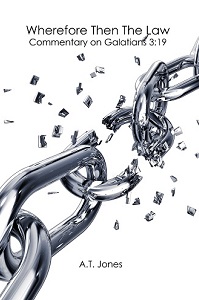A Revival of Primitive Godliness

Before the final visitation of God's judgments upon the earth there will be among the people of the Lord such a revival of primitive godliness as has not been witnessed since apostolic times. The Spirit and power of God will be poured out upon His children. At that time many will separate themselves from those churches in which the love of this world has supplanted love for God and His word. Many, both of ministers and people, will gladly accept those great truths which God has caused to be proclaimed at this time to prepare a people for the Lord's second coming. GC 464.1
Since the sermon from last Sabbath, March 11 2017, concerning The Penalty for Sin – God is not the author of death – it is evident that a bright light is beginning to dawn in the hearts of God’s people.
Isa 60:1-3 Arise, shine; for thy light is come, and the glory of the LORD is risen upon thee. (2) For, behold, the darkness shall cover the earth, and gross darkness the people: but the LORD shall arise upon thee, and his glory shall be seen upon thee. (3) And the Gentiles shall come to thy light, and kings to the brightness of thy rising.
The realisation that God was willing to forgive Lucifer without any threat of death or the use of force and the clear evidence that our Father did indeed forgive around one sixth of the angels after they had sided with Lucifer is revealing the character of our Father in such a beautiful light. Let us consider the evidence again:
God in His great mercy bore long with Lucifer. He was not immediately degraded from his exalted station when he first indulged the spirit of discontent, not even when he began to present his false claims before the loyal angels. Long was he retained in heaven. Again and again he was offered pardon on condition of repentance and submission.—GC, 495, 496.
Many of Satan's sympathizers were inclined to heed the counsel of the loyal angels, and repent of their dissatisfaction, and be again received to the confidence of the Father and his dear Son. 1SP 20,21
Many angels did indeed repent and were received into the confidence of the Father and His Son. The evidence is clear that nearly a half of the angels sided with Lucifer but only one third left their first estate.
Satan exultingly pointed to his sympathizers, comprising nearly one half of all the angels, and exclaimed, These are with me! 1 SP 22
When Satan became disaffected in heaven, he did not lay his complaint before God and Christ; but he went among the angels who thought him perfect and represented that God had done him injustice in preferring Christ to himself. The result of this misrepresentation was that through their sympathy with him one third of the angels lost their innocence, their high estate, and their happy home. {5T 291.1}
How can the Father simply forgive these angels without any penalty being imposed upon them? It is at this point that we come face to face with our sinful human nature and begin to grasp how influenced by Satan the sons and daughters of Adam really are. It is Satan that insisted that every sin must be punished.
In the opening of the great controversy, Satan had declared that the law of God could not be obeyed, that justice was inconsistent with mercy, and that, should the law be broken, it would be impossible for the sinner to be pardoned. Every sin must meet its punishment, urged Satan; and if God should remit the punishment of sin, He would not be a God of truth and justice. When men broke the law of God, and defied His will, Satan exulted. It was proved, he declared, that the law could not be obeyed; man could not be forgiven. Because he, after his rebellion, had been banished from heaven, Satan claimed that the human race must be forever shut out from God's favor. God could not be just, he urged, and yet show mercy to the sinner. {DA 761.4}
It is natural for us to believe that if God just forgave everyone that asked for forgiveness that it would show that God is weak and lacked the firmness to show Himself strong against wrongdoing. This whole mindset operates outside of the kingdom of God.
As we have been seeking to lay out before the people in the time since Day of Atonement Sept 30 2001 after the fall of the towers in New York, that the kingdom of God is a relational kingdom. Our value and worth as individuals is directly connected to our heavenly Father. When we doubt His goodness it causes Him tremendous pain. It is a pain that He is willing to bear because of His love for us. Yet once we know we have caused Him such pain, we have the choice to ask for forgiveness in anguish knowing that we have hurt Him or we can refuse to accept we have done anything wrong in order to avoid the anguish of knowing what we have done to Him. The refusal to acknowledge our guilt before Him then destroys our worth for such a refusal constitutes a resignation from the relationship we have with Him. He ceases to truly be our Father in our eyes and we begin to self-destruct for the sense of the consequent loss of worth.
This is a natural process not a legal one. The reason why our Father does not need to use force to punish those who would stray from Him is because firstly He is always willing to forgive and secondly when we realise how much He suffers because of our waywardness, this in itself is the punishment that prevents further transgression. Can we imagine the sorrow the angels who returned to God felt when they understood how much it hurt their Father to see them stand with Lucifer while he was standing boldly against our Father and seeking to force Him to his own will? Can we comprehend the joy these angels felt when they understood that the Father loved them and freely forgave them and held nothing against them? This is the barrier against transgression. It is seeing the agape of God in the face of our failures and the recognition of our true relationship to Him.
No other punishment would have been needed as a deterrent against straying from obedience to the Father and His Son. As Lucifer and the angels that stayed with him were fully aware of the loving character of God, their refusal to believe that God would forgive them sealed their doom. They attributed to God the characteristics of Satan and thus committed the unpardonable sin. The sin is unpardonable because the sinner determines this himself. He refuses to accept his error and places upon God that which is completely false thus breaking all hopes of salvation.
If Lucifer and his angels were the only ones to sin, the cross that the Father and Son experienced in the dissatisfaction and doubt of the angels concerning their character would probably not have been revealed in the crucifixion of Christ and yet the Father and Son did indeed suffer in this loss of confidence of the angels and in the loss of a third of their angelic children. When Adam and Eve joined the rebellion they did so after Satan had completely severed all belief in the forgiveness of God. In eating the fruit they were exposed to the mind of Satan. He began to infuse their mind with his own thinking about the character of God.
At First Satan assured them that God would overlook their transgression and nothing would happen. Yet when God came to them, their own sense of guilt in the presence of God caused them to fear death. As they were in the grip of Satan’s power, they had no ability to repent of their transgression. When Adam accused God of causing his downfall by creating Eve for him, Adam shutdown his feelings of remorse and any thoughts about the hurt he had caused the Father and His Son. He became dead in trespasses and sins. His soul went immediately white with spiritual leprosy. He lost all feeling for the terrible crime he had committed in doubting the goodness of God and accusing Him of causing the fall.
The only reason why man had a chance to be redeemed was because he did not fully know the character of the Father.
But even as a sinner, man was in a different position from that of Satan. Lucifer in heaven had sinned in the light of God's glory. To him as to no other created being was given a revelation of God's love. Understanding the character of God, knowing His goodness, Satan chose to follow his own selfish, independent will. This choice was final. There was no more that God could do to save him. But man was deceived; his mind was darkened by Satan's sophistry. The height and depth of the love of God he did not know. For him there was hope in a knowledge of God's love. By beholding His character he might be drawn back to God. {DA 761.5}
When Adam joined the ranks of Satan he was fully ready to enter into perfect harmony with Satan.
For this reason fallen angels and wicked men unite in desperate companionship. Had not God specially interposed, Satan and man would have entered into an alliance against Heaven; and instead of cherishing enmity against Satan, the whole human family would have been united in opposition to God. {GC 505.2}
By nature man accepted the lie that God would not forgive and this is why Adam initially never asked for forgiveness but rather blamed God and Eve for his fall. In order to give man access to a mind that would ask for forgiveness and believe in the mercy of God, Christ took man upon Himself from the foundation of the world. In joining Himself to man, He inherited all that man had taken for Himself. Therefore Christ inherited the sentence of death that Adam had taken upon himself. This was the only way that Christ could regain access to influence the mind of Adam. This is how God was enabled to put enmity between the serpent and the woman.
It is the grace that Christ implants in the soul which creates in man enmity against Satan. Without this converting grace and renewing power, man would continue the captive of Satan, a servant ever ready to do his bidding. But the new principle in the soul creates conflict where hitherto had been peace. The power which Christ imparts enables man to resist the tyrant and usurper. Whoever is seen to abhor sin instead of loving it, whoever resists and conquers those passions that have held sway within, displays the operation of a principle wholly from above. {GC 506.2}
This grace came at the cost of Christ inheriting the debt that man had created. Adam had set his destiny and that of all his children to die without any hope of forgiveness and under the deepest sense of condemnation. In order to give man this special grace, this enmity against sin, Christ must drink the entire cup that Adam had taken to himself.
The great tragedy for humanity is that the Satanic belief that every sin must be forcefully punished causes us to look upon the cross as an act of God against His Son to satisfy His wrath.
Isa 53:4 Surely he hath borne our griefs, and carried our sorrows: yet we did esteem him stricken, smitten of God, and afflicted.
It is the sense of justice that the human race inherited from Satan that causes us to believe that the bloody death of the cross was conceived and implemented by God as revenge for not strictly following Him. The truth is that Christ paid the penalty of sin that Satan and man had determined for the wrongdoer. The justice of God works upon this principle
Matt 7:2 For with what judgment ye judge, ye shall be judged: and with what measure ye mete, it shall be measured to you again.
The justice of God was met by allowing the choice of man to judge him. The love of God stepped in through the person of Christ and asked to take that penalty in man’s place. So it is certain that justice was served at the cross but Christ was not stricken, smitten of God and afflicted. He was smitten of Satan and man and afflicted and died according to the judgment of a merciless judgment system invented by Satan. Inheriting this death was the only means available to Christ to be able to place that enmity in the heart of the human race.
The condemning power of Satan would lead him to institute a theory of justice inconsistent with mercy. He claims to be officiating as the voice and power of God, claims that his decisions are justice, are pure and without fault. Thus he takes his position on the judgment seat and declares that his counsels are infallible. Here his merciless justice comes in, a counterfeit of justice, abhorrent to God. CTr 11.4
The Father’s face was hidden from His Son because Christ took this merciless justice system upon Himself. He cried my God why have you forsaken me, because it is the mind of man who believes that God forsakes him. Christ had to bear that curse and allow the Father’s face to be hidden from view. Even though the Father was right there with His Son, Jesus could not perceive it because our wretched human guilt was upon Him and caused Him such intense agony.
God permits His Son to be delivered up for our offenses. He Himself assumes toward the Sin Bearer the character of a judge, divesting Himself of the endearing qualities of a father. {TM 245.2}
How does God assume this character that is not His own? This is the ministration of death. In the mirror of God’s shining law of love, the human belief that God is a harsh judge comes back upon Christ.
Luke 19:22 And he saith unto him, Out of thine own mouth will I judge thee, thou wicked servant. Thou knewest that I was an austere man, taking up that I laid not down, and reaping that I did not sow:
Christ is made to endure a picture of His Father that is completely foreign to Him not because God is projecting this image but because this image is reflected back in the mirror of the law. As Christ looks into the law bearing our sin, He sees an overbearing tyrant ready to destroy Him. Christ sees the natural face of humanity projected onto His Father. Even though He knows this is not true, His feelings are overwhelmed with this terrible thought of this harsh judge. Satan is there to press these thoughts deep into the heart of Christ and this reveals him as the murderer that he truly is.
Look upon the Son of God as a poor defenceless child, shaking in terror and agony and without any hope of seeing His Father again and ask why must He suffer these things? Because humanity accepted the lie that God does not forgive sin and that every sin must be punished. In order to pay the debt of this wicked thinking, Christ became sin for us – sin being the belief that God does not forgive.
The realisation begins to dawn upon the mind that God truly is love and that God did not demand death as a punishment for sin but He was willing to pay that debt to save us.
I feel myself gingerly walking upon new and untested legs. I am living and breathing in a new world in the light of a grace that I could never have imagined. My eyes slowly open to the beautiful light of the true love of a Father for His wayward children.
But he whose eyes have been opened to see the love of Christ, will behold the character of God as full of love and compassion. God will not appear as a tyrannical, relentless being, but as a father longing to embrace his repenting son. The sinner will cry with the psalmist, “Like as a father pitieth his children, so the Lord pitieth them that fear him” (Psalm 103:13). All despair is swept from the soul when Christ is seen in His true character. {1SM 371.2}
The weight of the lie that every sin must be punished is lifting from my shoulders. I look into my own history and see why anger and frustration are often my experience when people treat me wrongly. The anger comes from the belief that every sin must be punished. This belief causes me to begin to plan some form of retaliation and the retaliation feels justified because every sin must be punished is the mantra that plays over and over in the soul.
Brothers and sisters we are invited into a new world that sin can indeed be forgiven. There does not need to be any retribution from us. We can follow our Saviours example
1 Peter 2:21-25 For even hereunto were ye called: because Christ also suffered for us, leaving us an example, that ye should follow his steps: (22) Who did no sin, neither was guile found in his mouth: (23) Who, when he was reviled, reviled not again; when he suffered, he threatened not; but committed himself to him that judgeth righteously: (24) Who his own self bare our sins in his own body on the tree, that we, being dead to sins, should live unto righteousness: by whose stripes ye were healed. (25) For ye were as sheep going astray; but are now returned unto the Shepherd and Bishop of your souls.
When He suffered, he threatened not but committed Himself to Him that judges righteously. This is our calling and we can enter into it when we see that God will indeed forgive and He does not need to use any force to bring justice.
This very morning I prayed for the Spirit to come to me in this manner. Now that I see these things I can pray intelligently for what I desire – I desire to feel no spirit of retaliation towards those who mistreat me. This is the spirit that will spark a revival of primitive godliness and cause a light to shine in the world that will brighten the whole earth with its glory.
Even so Lord Jesus come. Come into our hearts that we may truly love those who seek to hurt us or speak evil against us. Be ye therefore perfect as your Father in heaven is perfect, (Matt 5:48) which is to say be ye therefore merciful as your Father in heaven is merciful, (Luke 6:36).









